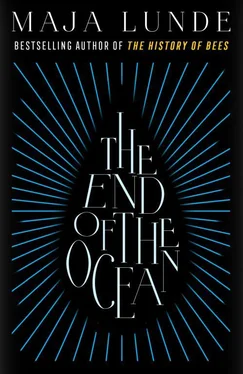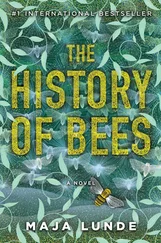But there’s no place to dock, not a single mooring point along the canal and, besides, I will obstruct boat traffic if I dock here.
I have to start up again and keep going.
It is hot and quiet, the sweat is pouring off me, my hair is greasy, I probably look a fright, no doubt I smell of boat—a mixture of old seawater, wet clothes, plastic, septic sludge and diesel—but it doesn’t matter, now I just have to do what I’ve come here to do.
Finally a guest harbor, in the center of Timbaut. I moor the boat quickly, but when I jump to shore, my heart is pounding as I realize that I can’t take the ice with me. I will have to leave it here while I find my way to his house empty-handed, alone.
I rent a bike, a modern, men’s bicycle with off-road tires. My feet barely reach the pedals and the screw connecting the seat to the pole is loose, so it keeps tipping backwards. I have to straighten it out by force, using my own balance, and this produces an odd, awkward bike-riding technique.
The city is exactly as I expected: sweet, charming, well-tended gardens, small tilting houses in mismatching colors, a boulangerie , a butcher, a bountiful florist’s. I cross the historic city center, where there’s a cobblestone square surrounded by trelliswork, and the overwhelming scent of hollyhock, lavender and freshly painted wrought-iron gates makes it difficult to breathe.
I slip forward on the bike seat, struggle to adjust my position, wobble a bit, lurch through a dip in the road, the front tire hits a cobblestone a bit more crooked than the others and I almost fall, but pull the bicycle upright just in time and keep going, away from the square, put the city center behind me, come out on the other side, pass an awning factory, turn a corner, keep riding down a hill, searching for a road sign, but can’t find any.
Then, on the next corner, a sign finally appears, but it’s wrong. I can see that as I get closer—I’m on the wrong street, I’ve missed my turn-off.
I have to turn around and ride back, sweating heavily. Finally, I stop at an intersection where one of the signs has the right name. Here it is, his street. It is lined with trees; the sun breaks through the treetops in patches, the leaves creating shadows in constant movement, even though today there is no wind.
I’m shaking as I concentrate on keeping the bike upright—I must not fall, must not lose my balance. I want to ride slowly but I can’t; due to the instability of the bicycle I have to maintain a certain speed.
Then it appears and at first I don’t believe that I’m here, that I have in fact made it, but a number on the wall indicates that this must be it and at first that’s all I see, the number, and then I see the house. It’s lovely, typically French, thick stone walls, green window shutters and a wrought-iron fence. The way I had imagined it.
But not exactly. Because it’s smaller, quite a simple house, the paint is flaking off the walls, the flower beds are untended, the shutters broken and the fence hasn’t had a fresh coat of paint for many years.
I stop outside and lower the bike to the ground.
He has a door knocker, not a doorbell—a copper dog’s head. I lift my hand, knock once, twice, before releasing it. My hand dangles at my side, my fingers stroking the fabric of my trousers. I wish I could hold on to something, my hand feels so empty, both hands so empty; now is the moment when I should have had the ice.
I listen for footsteps, but hear only insects, birds and the drone of farm machinery in the distance.
I lift my hand again, take hold of the copper dog’s head and knock again, harder this time.
Still nothing.
He’s not home. Nobody’s home.
I collapse on the stoop, suddenly parched. I didn’t bring any water. I should have had the ice, a cold lump on my tongue that would melt in my mouth, until my tongue was frozen and numb. I should have had the ice now.
I just sit there like that, completely still, but drifting all the same. A stoop, a closed door, I’m here and nothing has changed. This is it.
*
But then he comes.
Quick footsteps against the asphalt, that’s the first thing I hear—quick, light footsteps. I look up, he’s approaching me at a sprint, has already seen me; he’s sweating too, he’s out running, wearing shorts, a ragged T-shirt and well-worn running shoes that once upon a time were white.
How thin he is, sunken, his face has sharp edges and maybe it’s not him after all, maybe I’m not seeing clearly. It can’t be him; this wasn’t how he was supposed to be. And he’s running. I haven’t seen him run since he was a child, but now he’s running, with a surprising lightness, his feet hitting the ground rhythmically.
It’s him and he doesn’t stop running, he runs all the way up to me, through the gate. I’ve stood up without being aware of it, he runs all the way up to me, he’s sweating, I can smell it, but it’s not a bad odor, just fresh sweat, and I step down off the stoop and stand there facing him.
And then he throws his arms around me.
He throws his arms around me and laughs.
We moved into the house that very evening. It was only once we were there, inside the cool stone building, designed to absorb the heat, that I realized how confined and hot the boat had been.
The airiness was a relief. Lou ran through the rooms. So much space, she’d never had so much space before.
She changed her mind three times before she decided where she wanted to sleep. In a floral-patterned attic room begging to be inhabited by a little girl. With lace curtains and soft pillows on the bed.
For a few days… she would live there. For now.
I poured all the water we had into a transparent plastic container in the kitchen.
We would run out of water sooner now that there were three of us. Much sooner. It wouldn’t be enough, it wouldn’t last until the rain came.
But we weren’t going to live long anyway, and right now, right here, this was the life we had.
Dogs experience time differently from humans. For them, each day is like several weeks, for an ant the days are even longer. That’s how I thought, that’s how we thought, that was the kind of thing we said to each other, Marguerite and I.
We didn’t have the strength to fight any longer, to struggle. We just wanted to be here, together.
The few days that were ours would become a life.
*
When Lou had gone to bed beneath the flowery sky in the attic, when she had curled up, reveling in the clean sheets, then Marguerite and I came to life.
The energy we had formerly spent on struggling, fighting for our lives, we now applied to one another.
I invested all my strength in her and she invested hers in me. And the heat intensified everything.
We made our way around the house.
We were everywhere. First in the beds. Then on the couch. Against the kitchen counter. In the bathroom, in the dry shower. On the coffee table.
But then an evening came when the heat was intolerable, when it felt impossible to move inside the house.
So we took the blanket outside, lay down on the dry grass, on the ground under the trees, beside the trace of what had once been a brook, while the day slowly faded away.
There we had sex again. Quickly. It was too hot to continue for long.
Afterwards we lay beside each other, breathing hard.
My gaze slid across the darkening landscape. Across trees releasing dry leaves to the ground. The soon-to-be empty branches, where no birds were singing any longer.
My gaze slid onward, into the darkness between the trunks.
I jumped. Because there she stood. A little, white face. An astonished child’s face, which slowly changed as she gradually realized what she had just witnessed.
Читать дальше










